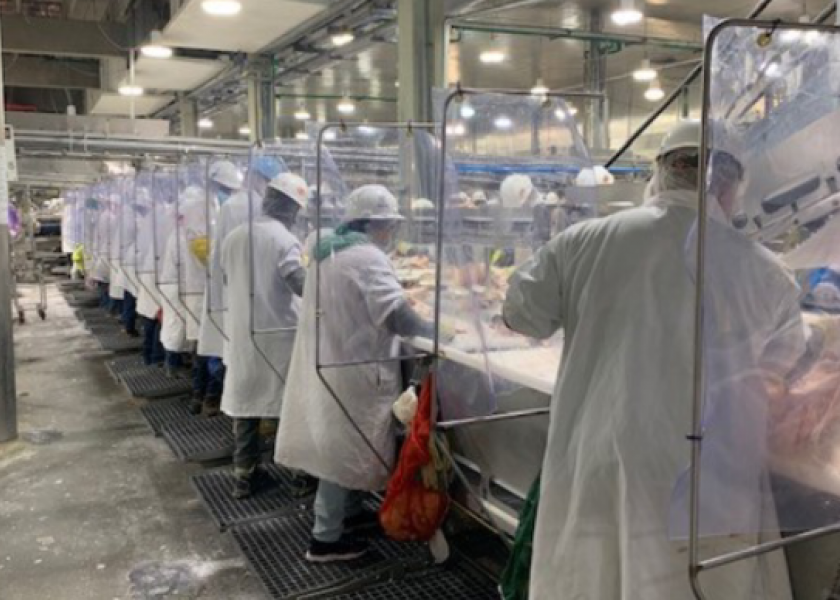WASHINGTON, DC – In Testimony submitted to the House Agriculture Committee, the North American Meat Institute (Meat Institute) today said the labor shortage continues to challenge the nation’s food supply chain raising the cost of all food for consumers.
“Just six weeks ago, the Biden Administration tried to blame the meat and poultry industry for the rising cost of food,” said Julie Anna Potts, President and CEO of the North American Meat Institute. “Today, the Congress will hear from other food manufacturers, shippers, input suppliers, growers and retailers enduring the same labor shortages up and down the food supply chain that are driving the record cost of food at the holidays.”
For Potts’ testimony, provided to the House Agriculture Committee for its hearing entitled, “The Immediate Challenges to our Nation’s Food Supply Chain,” go here.
The Meat Institute’s members are still recovering from the COVID-19 pandemic, which exacerbated existing labor challenges coupled with a significant increase in consumer demand.
This increase in demand happened while the packing sector’s ability to process livestock was experiencing operational constraints, and has continued into this year because labor availability has similarly affected the packing industry’s ability to operate at full capacity.
The Meat Institute has supported legislation to allow the meat and poultry industry access to an expanded, year-round agricultural guestworker program because the current, seasonal nature of the program fails to meet industry needs.
Throughout 2021, even as the comprehensive COVID-19 protections instituted by the meat industry since the spring of 2020 successfully lowered transmission among meatpacking workers and held case rates lower than case rates in the general U.S. population, worker shortages have persisted. The Meat Institute regularly hears from member companies challenged with 20 percent absenteeism on any day, as François Léger of FPL Food testified before the House Agriculture Committee on October 7.
In addition to labor, Potts outlined additional challenges to meat and poultry production, which includes ports congestion. The Meat Institute supports the Ocean Shipping Reform Act of 2021. Addressing this crisis also requires improving port efficiencies. Recent announcements by the Ports of Los Angeles and Long Beach to extend hours of operations must be matched with an adequate supply of labor, including truck drivers, along with extended warehouse hours to improve cargo flows. Urgent action is especially critical to enhance current port capacity, including using nearby empty lots for container storage and unloading, along with inland loading points.
Last spring, a federal judge blocked the U.S. Department of Agriculture’s (USDA) New Swine Inspection System (NSIS) rule. Then the Biden administration decided not to appeal the case, and line speeds for swine plants that participated in NSIS have been slowed since July 1. Some of these plants have been running at elevated line speeds for upwards of 20 years and demonstrated their ability to do so safely while maintaining and continuously improving worker safety.
In June – before the July 1 slowdown – the Meat Institute provided information to USDA regarding worker safety practices and draft criteria that could be included in a line speed waiver to address worker safety and inform future rule-making. Since then, although the Meat Institute has been told repeatedly the Department is close to finalizing criteria for line speed waivers, nothing has been issued.
“It is beyond past time for USDA to issue the criteria for line speed waivers: the NSIS plants – specially configured and staffed to operate under NSIS – have been operating at a competitive disadvantage since July 1, and hog slaughter capacity has been reduced,” said Potts. “With hog plants already running below capacity because of lack of labor, the additional slowdown due to slower line speeds is a self-inflicted wound by the administration.”
Finally, the Meat Institute is concerned about the vaccine mandate for federal employees and contractors. By statute, meat and poultry plants are subject to continuous federal inspection, without which product may not be shipped in commerce. The Meat Institute is concerned that if significant numbers of federal inspection personnel at USDA’s Food Safety and Inspection Service decline to get vaccinated, it will compound the inspector shortage and result in slowdowns at processing plants. Likewise, the Meat Institute has similar concerns about vaccine requirements creating labor shortages for federal contractors, such as the rail lines and trucking industry. The Meat Institute urges the federal government to develop viable contingency plans should there be significant attrition of federal inspectors due to this mandate.
About North American Meat Institute
The Meat Institute is the United States’ oldest and largest trade association representing packers and processors of beef, pork, lamb, veal, turkey, and processed meat products. NAMI members include more than 350 meat packing and processing companies, large and small, and account for more than 95 percent of the United States’ output of meat and 70 percent of turkey production. The Meat Institute provides legislative, regulatory, international affairs, public relations, technical, scientific, and educational services to the meat and poultry packing and processing industry.
About the Protein PACT: The Protein PACT unites partners across animal protein in the first-ever joint effort to accelerate the entire animal protein sector’s progress toward global sustainable development goals for healthy people, healthy animals, healthy communities, and a healthy environment. Protein PACT partners are establishing transparent baselines and benchmarks for our efforts, setting ambitious targets for continuous improvement, collecting data to verify and transparently report on progress, and launching comprehensive communications about animal protein’s unique place in sustainable, healthy diets. To learn more, visit www.TheProteinPACT.org.














